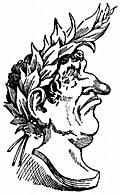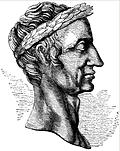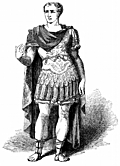Caesar, Julius
, the illustrious Roman general and historian, was of the family of the Julii, who pretended they were descended from Venus by Æneas. The descendants of Ascanius son offlLneas and Creusa, and surnamed Julius, lived at Alba till that city wns ruined by Tullus Hostilius, king of Rome, who carried them to Rome, where | they flourished. We do not find that they produced more than two branches. The first bore the name of Tullus, the other that of Cæsar. The most ancient of the Caesars were those who were in public employments in the llth year of the first Punic war. After that time we find there was always some of that family who enjoyed public offices in the commonwealth, till the time of Caius Julius Cæsar, the subject of this article. He was born at Rome the 12th of the month Quintilis, year of the city 653, and lost his father anno 669, and the year after he was made priest of Jupiter. Sylla was aware of his ambition, and endeavoured to remove him but Cæsar understood his intentions, and, to avoid discovery, changed every day his lodgings. He was received into Sylla’s friendship some time after; and the dictator told those who solicited the advancement of young Cæsar, that they were warm in the interest of a man who would prove some day or other the ruin of their country and of their liberty. When Cæsar went to finish his studies at Rhodes, under Apollonius Molo, he was seized by pirates, who offered him his liberty for thirty talents. He gave them forty, and threatened to revenge their insults; and he no sooner was out of their power than he armed a ship, pursued them, and crucified them all. His eloquence procured him friends at Rome; and the generous manner in which he lived, equally served to promote his interest. He obtained the office of high priest at the death of Metellus; and after he had passed through the inferior employments of the state, he was appointed over Spain, where he signalized himself by his valour and intrigues. At his return to Rome he was made consul, and soon after he effected a reconciliation between Crassus and Pompey. He was appointed for the space of five years over the Gauls, by the interest of Pompey, to whom he had given his daughter Julia in marriage. Here he enlarged the boundaries of the Roman empire by conquest, and invaded Britain, which was then unknown to the Roman people. He checked the Germans, and soon after had his government over Gaul prolonged to five other years, by means of his friends at Rome. The death of Julia and of Crassus, the corrupted state of the Roman senate, and the ambition of Cassar and Pompey, soon became the causes of a civil war. Neither of these celebrated Romans would suffer a superior, and the smallest matters were sufficient ground for unsheathing the sword. Cæsar’s | petitions were received with coldness or indifference bjr the Roman senate; and by the influence of Pompey, a decree was passed to strip him of his power. Antony, who opposed it as tribune, fled to Cæsar’s camp with the news; and the ambitious general no sooner heard this, than he made it a plea of resistance. On pretence of avenging the violence which had been offered to the sacred office of tribune in the person of Antony, he crossed the Rubicon, which was the boundary of his province. The passage of the Rubicon was a declaration of war, and Cæsar entered Italy sword in hand. Upon this, Pompey, with all the friends of liberty, left Rome, and retired to Dyrrachium and Cæsar, after he had subdued all Italy, in sixty days, entered Rome, and provided himself with money from the public treasury. He went to Spain, where he conquered the partizans of Pompey, under Petreius, Afranius, and Varro; and at his return to Rome was declared dictator, and soon after consul. When he left Rome he went in quest of Pompey, observing that he was marching against a general without troops, after having defeated troops without a general in Spain. In the plains of Pharsalia, B.C. 48, the two hostile generals engaged, Pompey was conquered, and fled into Egypt, where he was basely murdered. Cæsar, after he had made a noble use of victory, pursued his adversary into Egypt, where he sometime forgot his fame and character in the arms of Cleopatra, by whom he had a son. His danger was great while at Alexandria but he extricated himself with wonderful success, and made Egypt tributary to his power. After several conquests in Africa, the defeat of Cato, Scipio, and Juba, and that of Pompey‘a sons in Spain, he entered Rome, and triumphed over five different nations, Gaul, Alexandria, Pomus, Africa, and Spain, and was created perpetual dictator. But now his glory was at an end, his uncommon success created him enemies, and the chiefest of the senators, among whom was Brutus his most intimate friend, conspired against him, and stabbed him in the seriate house on the ides of March. He died, pierced with tuenty-tliree wounds, the 15th of March, B. C. 44, in the fifty-sixth year of his age. Casca gave him the first blow, and immediately he attempted to make some resistance; but when he saw Brutus among the conspirators, he submitted to his fate, and fell down at tlu-ir feet, muffling up his mantle, and exclaiming, M Tu quoque Brute 1*’ Cæsar | might have escaped the sword of the conspirators if he had listened to the advice of his wife Calpurnia, whose dreams, on the night previous to the day of his murder, were alarming. He also received, as he went to the senatehouse, a paper from Artemidorus, which discovered the whole conspiracy to him; but he neglected the reading of what might have saved his life. When he was in his first campaign in Spain, he was observed to gaze at a statue of Alexander, and even he shed tears at the recollection that that hero had conquered the world at an age in which he himself had done nothing. The learning of Cæsar deserves commendation, as well as his military character. He reformed the calendar. He wrote his commentaries on the Gallic wars on the spot where he fought his battles, and the composition has been admired for the elegance as well as the correctness of its style. This valuable book was nearly lost and when Cæsar saved his life in the bay of Alexandria, he was obliged to swim from his ship, with his arms in one hand and his commentaries in the other. Besides the Gallic and civil wars, he wrote other pieces which are now lost. The history of the war in Alexandria and Spain is attributed to him, and by others to Hirtius. Cæsar has been blamed for his debaucheries and expences, and the first year he had a public office, his debts were rated at 830 talents, which his friends discharged yet, in his public character, he must be reckoned one of the few heroes that rarely make their appearance among mankind. His qualities were such, that in every battle he could not be but conqueror* and in every republic, master; and to his sense of his superiority over the rest of the world, or to his ambition, we are to attribute his saying, that he wished rather to be first in a little village, than second at Rome. It was after his conquest over Pharnaces in one day, that he made use of these remarkable words, to express the celerity of his operations, “Veni, vidi, vici.” Conscious of the services of a man, who in the intervals of peace beautified and enriched the capital of his country with pubiic buildings, libraries, and porticoes, the senate permitted the dictator to wear a laurel crown on his bald head; and it is said, that, to reward his benevolence, they were going to give him the title or authority of king all ovftr the Roman empire, except Italy, when he was murdered. In his private character, Cæsar has been accused of seducing one of the Vestal virgins, and suspected of | being privy to Catiline’s conspiracy and it was his fondness for dissipated pleasures, which made his countrymen say, that he was the husband of all the women at Rome. It is said that he conquered 300 nations, took 800 cities, and defeated three millions of men, one of which fell in the field of battle. Pliny says?, that he could employ at the same time, his ears to listen, his eyes to read, his hand to write, and his mind to dictate. His death was preceded, as many authors mention, by uncommon prodigies and immediately after his death, a large comet made its appearance. Cæsar when young, was betrothed to Cossutia, a rich heiress, whom he dismissed to marry Cornelia, the daughter of Cinna, by whom he had Julia. His attachment to Cornelia was so great, that he never could be prevailed upon by the arts or threats of Sylla to divorce her; but her attachment he boldly preferred to his own personal safety. After her early death, which he lamented with great bitterness of grief, he married Pompeia, the grand-daughter of Sylla; and for his fourth wife he took Calpurnia, the daughter of the consul Piso, a connection formed from political motives. The best editions of Cesar’s Commentaries, are the magnificent one by Dr. Clarke, Lond. 1712, Hoi.; that of Cambridge, with a Greek translation, 1727, 4to; that of Oudendorp, 2 vols. 4to, L. Bat. 1737; that of Elzevir, 8vo, L. Bat. 1635; that of Homer, London, 1790, 2 vols. 8vo and of Oberlin, Leipsic, 1805, 8vo. 1
The life of Cæsar properly belongs to history, and is detailed at great length in every Roman history, particularly Hooke’s and the Universal History. For the above sketch we are indebted to Dr. Lempriere.






![[the book]](../../g/51A85AaLk0L._SL160_.jpg)